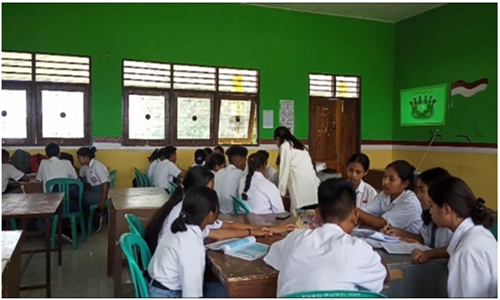
Application of the Pbl Learning Model Assisted by Video Media to Improve Student Learning Outcomes at Sman 1 Haharu
Abstract
Keywords
Full Text:
PDFReferences
Afiani, N. (2022). Efforts to Increase the Activity and Mathematics Learning Outcomes of Class. Educatif Journal of Education Research, 4(1), 65-72.
Agusti, R. H., Nasir, M., & Islami, N. (2023). Implementation of Contextual Teaching and Learning Based Physics Module on Newton's Law Material to Improve Critical Thinking Skills of Class X Students. Journal of Education and Learning Research, 1(1), 8-19.
Al-Hafidh, M. (2019). Application of the Problem Based Learning Model to Improve Student Activities and Learning Outcomes on Environmental Pollution Material at SMPN 3 Mutiara Pidie Regency (Doctoral dissertation, UIN Ar-Raniry Banda Aceh).
Ambarwati, D., & Kurniasih, M. D. (2021). The Influence Of Problem Based Learning Assisted By Youtube Media On Students' Numeracy Literacy Abilities. Scholarly Journal: Journal Of Mathematics Education, 5(3), 2857-2868.
Arsyad, A. (2016. Learning Media Jakarta: Raja Grafindo Persada.
Bella, S., Azhar, A., & Nur, I. (2023). Development of Think-Pair-Share (Tps) Model Based Learning Tools for Global Warming Materials. Journal of Education and Learning Research, 20-29.
Ernawati. (2020). The Effect of Problem Based Learning on Students' Communication Abilities and Mathematical Self-Efficacy, Sigma Learning and Mathematics Journal. 6(2), 62-71
Farida, F., Septina, N., & Komarudin, K. (2018). Developing Student Worksheets With a Scientific Approach Based On Problem Solving Abilities. Journal Tatsqif, 16(2), 160-
Fauzan, M., Gani, A., & Syukri, M. (2017). Application of the Problem Based Learning Model in Learning Solar System material to Improve Student Learning Outcomes. Indonesian Journal Of Science Education, 5(1), 27-35.
Pristiwanti, D., Badariah, B., Hidayat, S., & Dewi, R. S. (2022). Understanding Education. Journal of Education and Counseling (JPDK), 4(6), 7911-7915.
Rerung, N., Sinon, & Widyaningsih, S. W. (2017). Application of the Problem Based Learning (PBL) Learning Model to Improve High School Students' Learning Outcomes in Business and Energy Material. Scientific Journal of Physics Education, 6(1). 47–55.
Salam, R. (2017). Social Inquiry Learning Model in Social Sciences Learning. Social Sciences And Civics Learning Journal, 2(1), 1-12.
Sari, I. P., Sormin, R. K., Purba, A., Rahayu, A. P., & Khairas, E. E. (2023). Effectiveness of Flash Card Media To Improve Early Childhood English Letter and Vocabulary Recognition in Reading. Journal of Education and Learning Research, 1(1), 1-7.
Sari, R. A., & Purwanto. (2020). Analysis of Students' Mathematical Problem Solving Abilities Using a Model-Eliciting Activities Approach with Authentic E-Portfolio Based Assessment. Journal of Mathematics Education, 4(1), 42-55.
Taufiq, M. (2019). Problem-Based Learning (PBL) Model in Mathematics Learning. Journal of Mathematics Education, 9(2), 157-165.
Wijaya, W., Hapsari, S., P.S, M., & Hamid, A. (2020). The Influence of the Problem Based Learning (PBL) Model on Student Learning Outcomes in Science Learning Class VIII Semester II SMP Negeri 3/5 Medan T.P. 2019/2020. Journal of Physics Learning Innovation (INPAFI), 8(2), 76–82.
DOI: http://dx.doi.org/10.31258/jes.8.1.p.12-21
Refbacks
- There are currently no refbacks.
Copyright (c) 2024 Mutiara Rambu Tonda

This work is licensed under a Creative Commons Attribution 4.0 International License.
Publisher: FKIP Universitas Riau












